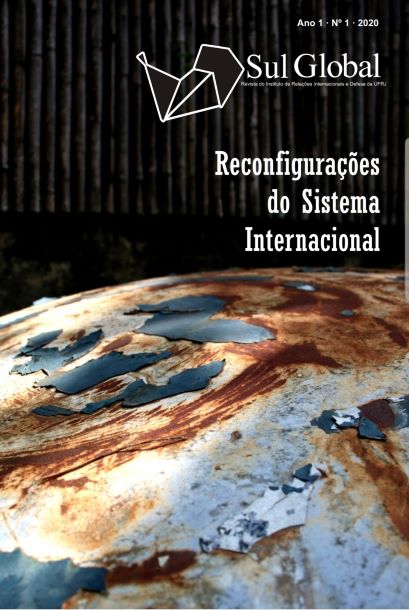UN Security Council Reform: The Political and the Desire to be Seized of the Matter
Keywords:
United Nations, International Decision-making, International OrderAbstract
The international political order has been 'normalized' through a number of principles that constitute our international legal and normative framework. The United Nations became one of the main sources of legitimacy informing the relation between states. This paper explores the role of United Nations Security Council (UNSC) in the universalization of rules and principles, and as a sovereign center where decisions on the normal and abnormal behaviors and subjectivities in the international are made. By identifying and regulating what constitutes the exception to the rule and to international peace and security, the permanent members of the UNSC find themselves in a position to also define the limits of normality in international politics. Developing further on these premises, we argue that the campaign for a reform of the UNSC sheds light on the political domain of the 'international order', a domain of dispute, undecidability, and potentiality.References
AGAMBEN, G. 1998. Homo Sacer: Sovereign power and bare life. Translated by D. HELLER-ROAZEN. Stanford: Stanford University Press.
BACCARINI, M. 2010. “A Evolução dos Métodos de Trabalho e a Emergência do Consenso no Conselho de Segurança da ONU: A Tomada de Decisão por Comitês”. Revista Carta Internacional, v. 12, n. 2, pp. 5-29.
CRONIN, B.; HURD, I. (eds.). 2008. The UN Security Council and the politics of international authority. London: Routledge.
DA SILVA, L. I. L. 2003. “Statement by H.E. Luiz Inácio Lula da Silva, President of the Federative Republic of Brazil, At the Opening of the General Debate of the 58h Session of the United Nations General Assembly – September 23, 2003”. Available at: <http://www.un.org/webcast/ga/58/statements/braeng030923.htm>. Accessed June 8, 2018.
DA SILVA, L. I. L. 2004. “Statement by H.E. Luiz Inácio Lula da Silva, President of the Federative Republic of Brazil, At the Opening of the General Debate of the 59th Session of the United Nations General Assembly – September 21, 2004”. Available at: <https://www.un.org/webcast/ga/59/statements/braeng040921.pdf>. Accessed June 8, 2018.
FASSBENDER, B. 2009. “Rediscovering a Forgotten Constitution: Notes on the Place of the UN Charter in the International Legal Order”. In: DUNOFF, J. L.; TRACHTMAN, J. P. (eds.). Ruling the world? Constitutionalism International Law and Global Governance. Cambridge, MA: Cambridge University Press, pp.133-147.
G4. 2011. Ministerial Meeting of the G4 countries (Brazil, Germany, India and Japan): Joint Press Statement – February 11, 2011. Available at: <http://www.itamaraty.gov.br/en/ficha-pais/578-diplomacia-publica/press-releases/9657-ministerial-meeting-of-the-g4-countries-brazil-germany-india-and-japan-joint-press-statement>. Accessed May 30, 2018.
G4. 2017. Joint G4 Statement delivered by H.E. Ambassador Koro Bessho, Permanent Representative of Japan to the United Nations, at the plenary meeting of the General Assembly - November 2017. Available at: <http://papersmart.unmeetings.org/media2/16155102/japan-on-behalf-of-the-group-of-four-brazil-germany-india-and-japan-.pdf>. Accessed June 8, 2018.
HEUSGEN, C. 2017. Statement by Ambassador Dr Christoph Heusgen, Permanent Representative of Germany to the United Nations in the General Assembly – November 7, 2017. Available at: <http://papersmart.unmeetings.org/media2/16155172/germany.pdf>. Accessed June 8, 2018.
HOSSAIN, K. 2005. “The Concept of Jus Cogens and the Obligation Under The U.N. Charter”. Santa Clara Journal of International Law, v. 3, n. 1, pp. 72-98.
KALYVAS, A. 2008. Democracy and the politics of the extraordinary: Max Weber, Carl Schmitt, and Hannah Arendt. Cambridge, MA: Cambridge University Press.
KELSEN, H. 1945. General theory of law and state. Translated by A. WEDBERG. Cambridge, MA: Harvard University Press.
KELSEN, H. 1946. “Organization and Procedure of the Security Council of the United Nations”. Harvard Law Review, v. 59, n. 7, pp. 1087-1121.
ROUSSEF, D. 2011. “Statement by H.E. Dilma Roussef, President of the Federative Republic of Brazil, At the Opening of the General Debate of the 66th Session of the United Nations General Assembly – September 21, 2011”. Available at: <https://gadebate.un.org/en/66/brazil>. Accessed June 8, 2018.
SEITENFUS, R. 2012. Manual das Organizações Internacionais. Porto Alegre: Livraria do Advogado Editora.
SIMMA, B. et al. 2002. The Charter of the United Nations: A commentary. Oxford: Oxford University Press.
SHAPIRO, M. J. 1988. The politics of representation: Writing practices in biography, photography, and policy analysis. Madison: University of Wisconsin Press.
SCHMITT, C. 1985. Political theology: Four chapters on the concept of sovereignty. Cambridge, MA: MIT Press.
Schmitt, C. 1996. The concept of the political. Chicago: University of Chicago Press.
UNITED NATIONS GENERAL ASSEMBLY (UNGA). 2004. “A more secure world: our shared responsibility. Report of the High-level Panel on Threats, Challenges and Change –A/59/595”. Available at: <https://documents-dds-ny.un.org/doc/UNDOC/GEN/N04/602/31/PDF/N0460231.pdf?OpenElement>. Accessed May 27, 2018.
UNITED NATIONS GENERAL ASSEMBLY (UNGA). 2005. “Question of equitable representation on and increase in the membership of the Security Council and related matters - A/59/L.64”. Available at: <https://undocs.org/a/59/L.64>. Accessed June 8, 2018.
VALLE, V. M. 2005. “A Reforma do Conselho de Segurança da ONU: uma análise sobre a posição brasileira e suas repercussões”. Cadernos Adenauer, v. 6, n. 1, pp. 95-126.
VOETEN, E. 2008. “Delegation and the nature of Security Council authority.” In: CRONIN, B.; HURD, I. (eds.). The UN Security Council and the politics of international authority. London: Routledge. pp. 43-56
WALKER, R. B. J. 2006. “The Double Outside of the Modern International”. Ephemera:
Theory and Politics in Organization 6, no. 1, 56-69.
WEBER, M. 2004. The vocation lectures, translated by R. LIVINGSTONE. Indianapolis: Hackett.

